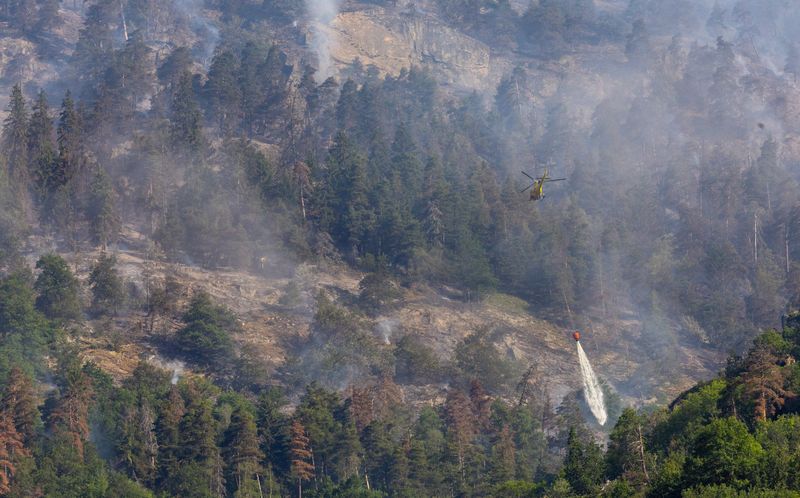By Denis Balibouse
BITSCH, Switzerland (Reuters) -Swiss firefighters on Tuesday were battling a forest fire that has forced more than 200 people to evacuate, and authorities warned winds were making the blaze difficult to contain.
The fire broke out on Monday on the forested flank of a mountain in Bitsch in the Valais canton near the Italian border. Helicopters hovered overhead throughout the night to drop water onto the blaze.
It could take days or weeks to fully put out the fire, which has spread to 100 hectares (250 acres) of forest, said Mario Schaller, who is in charge of firefighting operations.
"In the last half hour, several fires flared up again," he said. "The situation is not yet under control. The firefighting will continue until late into the night."
The blaze had eased earlier on Tuesday but began intensifying again due to the wind.
The Swiss government said that starting on Wednesday, militia soldiers would be called upon to detect smouldering fires. The Swiss army had previously dispatched a helicopter to support firefighting efforts.
The situation could deteriorate further if winds grow stronger, said Adrienne Bellwald, spokesperson for the cantonal police.
In separate comments, the cantonal police department said an investigation had been opened to determine the cause of the fire.
Switzerland is warming at more than twice the global average, partly due to its distance from the ocean which helps absorb extra heat.
Its Federal Office for the Environment has warned forest fires could become more frequent, especially in summer, due to an increase in hot, dry weather caused by climate change.

The current conflagration has already destroyed more than half the forest area that would have been burned by more than 100 smaller fires in a typical year, the same government department said in emailed comments to Reuters.
Large areas of Europe, Asia and the United States are suffering extreme weather and the World Meteorological Organization warned the northern hemisphere heatwave is set to intensify this week.